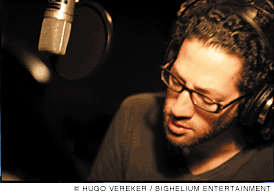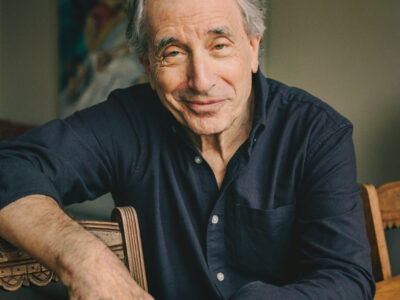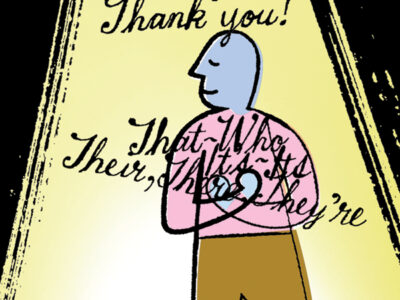
Although definitive studies aren’t available —yet—it seems safe to say that Gabriel Mann C’95 isn’t the first singer-songwriter-keyboardist to be influenced by Billy Joel. But for Mann (known as Gabriel Rutman before he ditched the surname to “get out of a rut”), it was a double dose of Piano Man inspiration that got him going.
Mann was a high-school student in San Antonio when he savored his first nibble of crowd acclaim, performing Joel’s ballad “Vienna” at a talent show. And Joel’s Glass Houses—whose front and back covers show Joel just before and after he has shattered a glass-fronted structure—was the first album Mann ever bought.
Mann, now 31, has done some symbolic glass-smashing of his own. As a Penn undergrad, he broke through the panes of his career expectations (studying musical composition and medicine) by deep-sixing what he calls, in Yiddish, the tsoris of dual intentions (“my brain was splitting in half”) to devote his attention to music.
When he broke the news in a phone call to his parents, their reaction wasn’t grief, but relief. “They didn’t really understand why I was in pre-med in the first place,” he said during a recent telephone interview from Los Angeles, where he lives with his wife, aspiring-screenwriter Allison Bloom.
After graduating from Penn —where he sang with the a cappella group Off the Beat and took in Philadelphia’s hip-hop scene—Mann headed to the West Coast. He studied film-scoring at USC, and soon put that skill to good use, providing music for the quirky but acclaimed Fox TV sitcom Arrested Development and the 2004 theatrical film Sleepover. (The video-game music he composes also helps pay the rent.)
But Mann aspires to success in more individualistic musical expression as well. He achieved that in 2002 with his self-released, self-assured-sounding pop-rock Tug of WarCD, accompanied by his backing band of that time, which featured bassist-vocalist Michael Blanchard and drummer-vocalist Adam Marcello. While he only learned after the fact that another melodist—some guy named Paul McCartney—had also put out an album by that name, Mann is quick to acknowledge his debts to other “old-school songwriters,” including Ben Folds, Marc Cohn, Joel, Bruce Hornsby, and Elvis Costello. Tug of War has a number of strong compositions, including the haunting “Fire in Your Hand”; “Slumber,” a rocky tale of romantic yearning that draws its edge from Chris Lee’s tasty guitar; “In Deep,” a story of alternately sunny and confused love punctuated by Mann’s spunky keyboards; and the opening cut, “Lighted Up.” That last song—a seductive, shimmering rumination on long-distance romance—earned Mann a 2003 USA Songwriting grand prize. Knowing a good song when he hears—and writes—one (and he admits that words come harder to him than music, though he’s gaining confidence in his lyrics), Mann included two different versions of “Lighted Up” on a six-cut, live-in-studio EP released in conjunction with the South by Southwest music festival this past March.
He will soon be issuing another full-length, as-yet untitled CD (backed by drummer Marcello and bassist Carson Cohen), which will lean more heavily on keyboards than did the cuts on Tug of War. Mann also had the opportunity this year to tour small venues of 250 to 750 people in Atlanta, Chicago, and Detroit as opening act for British singer Jaime Cullum. Accompanied only by his own piano-playing, Mann says he was pleasantly “spoiled” by the warm reception his music got from Cullum’s fans. He was also scheduled to perform at Home-coming last month for the Alumni Award of Merit Gala at the new World Café Live.
—Stuart Michaelson




